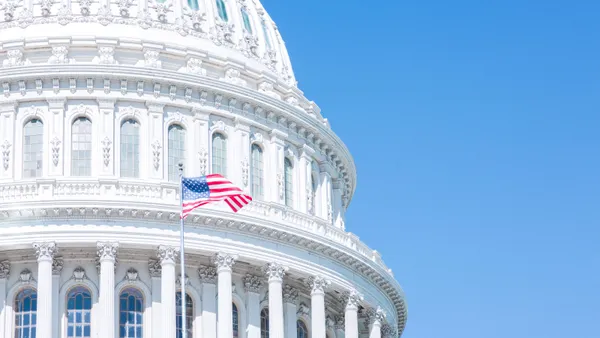Dive Brief:
- A memorandum of understanding governing funds from the Regional Greenhouse Gas Initiative directs 25% of a state's share to efficiency and clean energy, but Bloomberg BNA reports two states have plans for the funds that some believe run afoul of those rules.
- New York Gov. Andrew Cuomo (D), in the state's most recent budget, directed almost $70 million be moved from the RGGI auction funds, but it is unclear if the reason – related energy programs – actually runs afoul of the rules.
- Connecticut, facing a more-than $900 million budget shortfall, is considering moving $20 million to the general fund, a more clear-cut violation of the compact's spirit.
Dive Insight:
Bloomberg digs into a potential brewing controversy, where plans in Connecticut and New York call for using RGGI funds in ways not explicitly laid out by the nine-member compact.
While New York is using the funds for clean-energy related projects, including funding a clean energy jobs program at the State University of New York, Connecticut's general fund move is simply to help cover a budget shortfall.
Acadia Center Director Jamie Howland told Bloomberg the group is "deeply troubled by this shortsighted proposal...The raid would disadvantage consumers, increase pollution, undermine the state's leadership on climate and further erode confidence in the predictability of policy making.”
A spokesman for the Institute for Energy Research told Bloomberg BNA that cap-and-trade programs are "ripe" for abuse from government entities. IER opposes the RGGI program.
“Cap-and-trade programs and carbon taxes are ripe for this sort of abuse,” Chris Warren told Bloomberg BNA in an e-mail. “It’s an inherent problem that isn’t unique to RGGI.”
“Politicians get their foot in the door by selling us solutions to climate change and making lofty promises about how the revenue will be spent,” he said. “However, at the end of the day, these programs aren’t about the climate or the environment. They’re about opening up another stream of revenue for politicians to spend how they please.”
Even so, the Northeast's RGGI program is widely viewed as a success, and an example of what states can do when they band together to reduce carbon emissions. So far the sates involved have funded RGGI programs that have saved more than 1.8 million MWh and expect to produce almost $3 billion in savings.
In December, RGGI announced the results of its 30th auction for carbon allowances, with 15,374,274 CO2 allowances sold at a clearing price of $7.50/st. The auction generated more than $115 million for reinvestment in strategic programs, including energy efficiency, renewable energy, and direct bill assistance.















